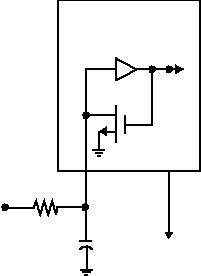© 2000 Scenix Semiconductor, Inc. All rights reserved.
- 26 -
www.scenix.com
SX48BD/SX52BD/SX52BD75/SX52BD100
8.2
External RC Mode
The external RC oscillator mode provides a cost-effective
approach for applications that do not require a precise
operating frequency. In this mode, the RC oscillator fre-
quency is a function of the supply voltage, the resistor (R)
and capacitor (C) values, and the operating temperature.
In addition, the oscillator frequency will vary from unit to
unit due to normal manufacturing process variations. Fur-
thermore, the difference in lead frame capacitance
between package types also affects the oscillation fre-
quency, especially for low C values. The external R and
C component tolerances contribute to oscillator fre-
quency variation as well.
Figure8-3 shows the external RC connection diagram.
The recommended R value is from 3kW to 100kW. For R
values below 2.2kW, the oscillator may become unstable,
or may stop completely. For very high R values (such as
1 MW), the oscillator becomes sensitive to noise, humid-
ity, and leakage.
Although the oscillator will operate with no external
capacitor (C = 0pF), it is recommended that you use val-
ues above 20 pF for noise immunity and stability. With no
or small external capacitance, the oscillation frequency
can vary significantly due to variation in PCB trace or
package lead frame capacitances.
8.3
Internal RC Mode
The internal RC mode uses an internal oscillator, so the
device does not need any external components. At 4
MHz, the internal oscillator provides typically +/–8%
accuracy over the allowed temperature range. The inter-
nal clock frequency can be divided down to provide one
of eight lower-frequency choices by selecting the desired
value in the FUSE Word register. The frequency range is
from 31.25 kHz to 4 MHz.The default operating fre-
quency of the internal RC oscillator may not be 4 MHz.
This is due to the fact that the SX device requires trim-
ming to obtain 4 MHz operation. The parts shipped out of
the factory are not trimmed. The device relies on the pro-
gramming tool provided by the third party vendors to sup-
port trimming. During internal RC mode, OSC1 is high
impedance and OSC2 pulled low.
Figure 8-3. RC Oscillator Mode
Vdd
R
C
Internal
Circuitry
OSC2
OSC1
N
~
SX Device
